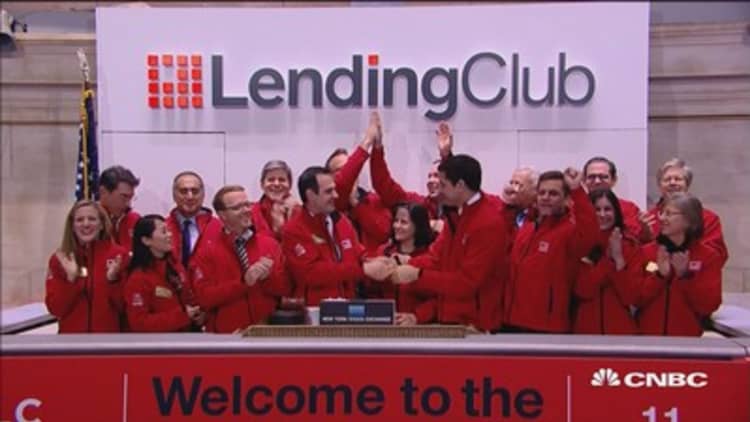The same innovation tech brought to finance and consumers is coming for what the U.S. Treasury calls the $1 trillion-per-year domestic insurance market.
Much like the way Groupon leveraged the buying power of groups and peer-to-peer lender Lending Club cut out the middle man to offer lower rates for borrowers, new start-ups are looking to lower insurance premiums and open the door to outside investors. (Tweet This)
In some cases, it's even the same group of people. Visar Nimani, Lending Club's former CTO, spent months with his team—including fellow Lending Club alumni—exploring how to apply the same marketplace they built for loans to the insurance sector at his new start-up, Uvamo.
"Insurance companies obviously make significant amounts of money, they run commercials," he joked. "But the average investor hasn't had a way to get involved with that." Uvamo wants to change that.
How would it work?
Today, the insurance business tends to have high overhead costs, and too much of the premiums consumers pay aren't purely going into covering losses, Nimani said.
Uvamo, which plans to launch by the end of the year, aims to cut administrative costs by offering property and casualty insurance direct to consumers online. Those policies can then be diversified and grouped into a pool, which collects all the premiums paid by the policyholders.
There's also an opportunity for outside investors, who can invest money to back that pool of policies, making up the required capital reserve.
Investors—and Uvamo—profit from whatever money's left in the premium pool after all claims have been paid out. And while those pooled premiums are typically enough to cover a pool's cost of claims, outside investors' funds would cover the remainder if they aren't, Nimani said.
Investors would only be on the hook for the money they originally invest—Uvamo would be responsible for the any claims that go beyond the money in the pool, Nimani said. When the policies of a pool expire, investors are returned their original investment, plus the excess in premiums leftover after Uvamo takes a small percentage.

Funds themselves can be rated for risk similar to the way personal or business loans are with peer-to-peer financing, giving investors risk flexibility. Take auto insurance as an example, which Uvamo hopes to offer after launching. In lieu of a credit score, a driver's history as well as all other basic information insurers typically receive, could help score the riskiness of any given fund.
Beyond offering flexibility and relatively low-risk returns, access to insurance offers a distinct way for investors to diversify risk across a portfolio. "The beauty of insurance is that it's not tied to economic downturns," Nimani said. "It will be a very important risk diversification asset for investors."
Of course, Uvamo faces strict regulations similar to what Lending Club experienced when starting out. Terri Vaughan, former CEO at the National Association of Insurance Commissioners, says Uvamo will face not only securities regulation, but also strict scrutiny from insurance regulators who must ensure "any insurance company has enough money there to be paid to policyholders."
"I understand the need for that regulation though," Nimani said. "It's necessary any time you're taking money from a consumer and making a promise." The fact that insurance in the U.S. is regulated state by state isn't making things any easier. With different state laws come different intricacies and the per-state licensing costs can be quite high.
Read More Advisors put insurance on menu to cater to clients
It's that regulation coupled with a high capital requirement that doesn't bode well for a typical start-up, but Nimani is confident as Uvamo launches its Series A funding round. And even if the tech company can only repeat half the success Lending Club has had so far, it could still become a more than $3 billion business in the insurance world.
Should insurers be worried?
Not all new insurance modes are being built with the goal of replacing big companies. Bought By Many, a U.K.-based insurance start-up in its fourth year, operates as a broker between insurers and customers, helping both in the process.
It looks to leverage the buying power of groups, similar to the way Groupon can get businesses to offer discounts by guaranteeing customers. But instead of using that collective buying power to bring about discounts, Bought By Many uses the leverage to secure lower premiums for individuals seeking similar insurance coverage.
And while the company says that leverage has led to about a 20 percent reduction in premiums for groups, it's also brought coverage to customers who have notoriously had a hard time finding insurance in the first place. Pet owners, for example, were among the first who were able to demand more comprehensive policies that included specialized coverage for problems that are often unique to a specific breed. Now, Bought By Many boasts over 100 different pet groups, and co-founder Steven Mendel says it's exactly that same specialization and group buying power helping elder customers and those with existing conditions find their perfect policy at a fair price.
Read MoreA teen will cost you this much more on insurance
That's also helping insurers maintain satisfied customers. "We help them target the risks they want, but at a lower cost and more precisely than they can reach themselves," he said.
After closing its second round of funding with private investors, Mendel says the company is looking to broaden coverage into other areas, such as policies negotiated specifically for employees at start-ups, and will look to expand operations into another country. But due to the U.S. insurance regulations Uvamo knows all too well, don't expect Bought By Many to cross the pond anytime soon.
And while the solutions of Uvamo and Bought By Many may differ in structure, Mendel says the sleepy industry's problem they are attempting to fix is one and the same. "Insurance hasn't changed for decades," he said. "Yet the rest of the world has moved on enormously."


